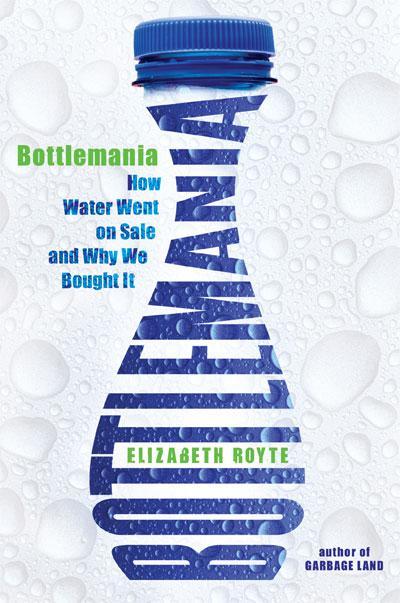 Bottlemania marks the second book that I’ve read (and now reviewed) written by Elizabeth Royte. Much like Garbage Land, Royte’s first book I read, Bottlemania has a fluid narrative. Royte does a wonderful job of weaving the story of one town’s relationship with bottled water into a larger discussion of the resource turned commodity. In addition, Bottlemania has provided a wealth of data for past Five Friday Facts.
Bottlemania marks the second book that I’ve read (and now reviewed) written by Elizabeth Royte. Much like Garbage Land, Royte’s first book I read, Bottlemania has a fluid narrative. Royte does a wonderful job of weaving the story of one town’s relationship with bottled water into a larger discussion of the resource turned commodity. In addition, Bottlemania has provided a wealth of data for past Five Friday Facts.
Much of Royte’s research comes via interviews and meetings with those involved in the bottled water industry, as well as managers of public water utilities. One recurring question that Royte deals with throughout the book centers on tap vs. bottled water. On the whole, she provides a balanced critique of both players. The social and environmental impacts of bottled water – along with the expense and lack of strictly enforced regulation – paint a rather unsavory picture. However, tap water, which is regulated by the EPA, also received the microscope treatment. Deadly outbreaks and an aging infrastructure were the two greatest issues that surfaced when looking into municipal supplies.
Throughout the book, Royte returns to the town of Freyburg, Maine. In their battle against Poland Spring, the town and it’s citizens have gone to great lengths to preserve their water. This microcosm serves as a powerful indicator of the clash between corporations and municipalities. In the case of Freyburg, the environmental impacts did not outweigh the fiscal benefits or the uncertainty as to whether their water source could support long term pumping for the company and the town. Many of these battles end up in the courts. Freyburg’s battle went all the way to Maine’s Supreme Court, but they remanded the case back to the town council.
In addition to the tap vs. bottled water question, the Freyburg example placed the privatization of one of nature’s most invaluable resources at the heart of debate. What will the future of water look like? Unfortunately, Royte makes the argument that it’s not as clear as one might think. Take Fiji Water. It is often derided as an extravagance, taken from one watershed and shipped to the corners of the earth. However, the company that owns Fiji Water has invested in the area around the bottling plant. This includes social projects like education for those who inhabit the area.Overall, Royte’s treatment of the subject is evenhanded. Her writing style enables seamless reading and does not lend itself to rereading sections. Through her experiences and interviews, the book maintains a human aspect for a subject that could easily devolve into something much more mundane.
[Image source]

